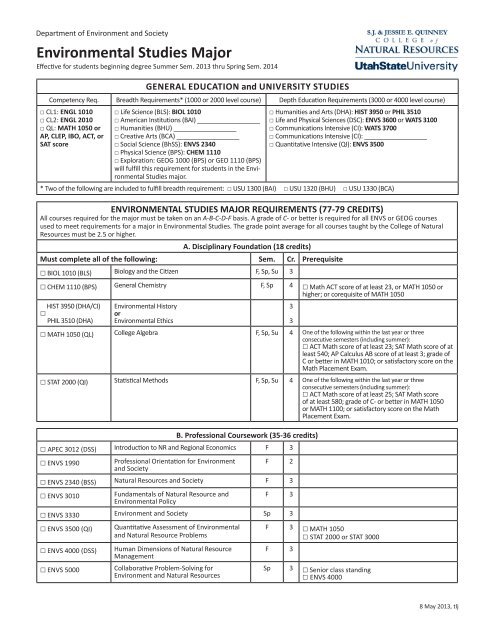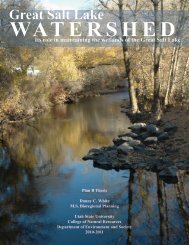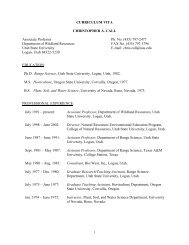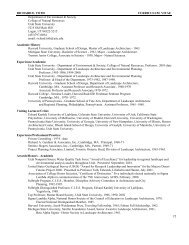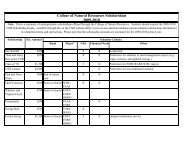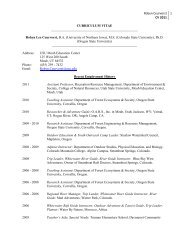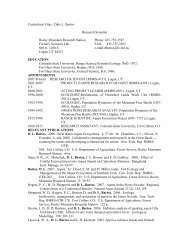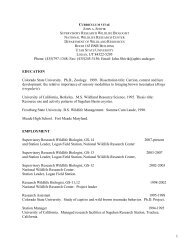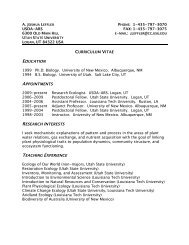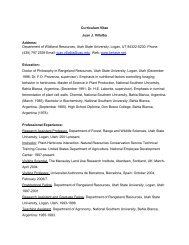Environmental Studies Major Requirements
Environmental Studies Major Requirements
Environmental Studies Major Requirements
You also want an ePaper? Increase the reach of your titles
YUMPU automatically turns print PDFs into web optimized ePapers that Google loves.
Department of Environment and Society<br />
<strong>Environmental</strong> <strong>Studies</strong> <strong>Major</strong><br />
Effective for students beginning degree Summer Sem. 2013 thru Spring Sem. 2014<br />
GENERAL EDUCATION and UNIVERSITY STUDIES<br />
Competency Req. Breadth <strong>Requirements</strong>* (1000 or 2000 level course) Depth Education <strong>Requirements</strong> (3000 or 4000 level course)<br />
□ CL1: ENGL 1010<br />
□ CL2: ENGL 2010<br />
□ QL: MATH 1050 or<br />
AP, CLEP, IBO, ACT, or<br />
SAT score<br />
□ Life Science (BLS): BIOL 1010<br />
□ American Institutions (BAI) __________________<br />
□ Humanities (BHU) __________________<br />
□ Creative Arts (BCA) __________________<br />
□ Social Science (BhSS): ENVS 2340<br />
□ Physical Science (BPS): CHEM 1110<br />
□ Exploration: GEOG 1000 (BPS) or GEO 1110 (BPS)<br />
will fulfill this requirement for students in the <strong>Environmental</strong><br />
<strong>Studies</strong> major.<br />
□ Humanities and Arts (DHA): HIST 3950 or PHIL 3510<br />
□ Life and Physical Sciences (DSC): ENVS 3600 or WATS 3100<br />
□ Communications Intensive (CI): WATS 3700<br />
□ Communications Intensive (CI): __________________<br />
□ Quantitative Intensive (QI): ENVS 3500<br />
* Two of the following are included to fulfill breadth requirement: □ USU 1300 (BAI) □ USU 1320 (BHU) □ USU 1330 (BCA)<br />
ENVIRONMENTAL STUDIES MAJOR REQUIREMENTS (77-79 CREDITS)<br />
All courses required for the major must be taken on an A-B-C-D-F basis. A grade of C- or better is required for all ENVS or GEOG courses<br />
used to meet requirements for a major in <strong>Environmental</strong> <strong>Studies</strong>. The grade point average for all courses taught by the College of Natural<br />
Resources must be 2.5 or higher.<br />
A. Disciplinary Foundation (18 credits)<br />
Must complete all of the following: Sem. Cr. Prerequisite<br />
□ BIOL 1010 (BLS) Biology and the Citizen F, Sp, Su 3<br />
□ CHEM 1110 (BPS) General Chemistry F, Sp 4 □ Math ACT score of at least 23, or MATH 1050 or<br />
higher; or corequisite of MATH 1050<br />
HIST 3950 (DHA/CI)<br />
□<br />
PHIL 3510 (DHA)<br />
<strong>Environmental</strong> History<br />
or<br />
<strong>Environmental</strong> Ethics<br />
3<br />
3<br />
□ MATH 1050 (QL) College Algebra F, Sp, Su 4 One of the following within the last year or three<br />
consecutive semesters (including summer):<br />
□ ACT Math score of at least 23; SAT Math score of at<br />
least 540; AP Calculus AB score of at least 3; grade of<br />
C or better in MATH 1010; or satisfactory score on the<br />
Math Placement Exam.<br />
□ STAT 2000 (QI) Statistical Methods F, Sp, Su 4 One of the following within the last year or three<br />
consecutive semesters (including summer):<br />
□ ACT Math score of at least 25; SAT Math score<br />
of at least 580; grade of C- or better in MATH 1050<br />
or MATH 1100; or satisfactory score on the Math<br />
Placement Exam.<br />
B. Professional Coursework (35-36 credits)<br />
□ APEC 3012 (DSS) Introduction to NR and Regional Economics F 3<br />
□ ENVS 1990<br />
Professional Orientation for Environment<br />
and Society<br />
F 2<br />
□ ENVS 2340 (BSS) Natural Resources and Society F 3<br />
□ ENVS 3010<br />
Fundamentals of Natural Resource and<br />
<strong>Environmental</strong> Policy<br />
F 3<br />
□ ENVS 3330 Environment and Society Sp 3<br />
□ ENVS 3500 (QI) Quantitative Assessment of <strong>Environmental</strong><br />
and Natural Resource Problems<br />
□ ENVS 4000 (DSS)<br />
□ ENVS 5000<br />
Human Dimensions of Natural Resource<br />
Management<br />
Collaborative Problem-Solving for<br />
Environment and Natural Resources<br />
F 3 □ MATH 1050<br />
□ STAT 2000 or STAT 3000<br />
F 3<br />
Sp 3 □ Senior class standing<br />
□ ENVS 4000<br />
8 May 2013, tlj
□<br />
GEOG 1000 (BPS)<br />
GEO 1110 (BPS)<br />
GEO 1115<br />
□ GEOG 1800<br />
Physical Geography<br />
or<br />
Physical Geology and<br />
Physical Geology Lab<br />
Introduction to Geographic Information<br />
Sciences<br />
F<br />
F, Sp, Su<br />
F, Sp<br />
3<br />
3<br />
1<br />
F 3<br />
□ WATS 3700 (CI) Fundamentals of Watershed Science Sp 3<br />
□ WILD 2200 (BLS) Ecology of our Changing World F, Sp 3<br />
□<br />
ENVS 3600 (DSC)<br />
WATS 3100 (DSC/CI)<br />
BIOL 3040 (DSC)<br />
PSC 3500<br />
WILD 3600<br />
Living with Wildlife<br />
Fish Diversity and Conservation<br />
Plants and Civilization<br />
Structure and Function of Plants<br />
Wildland Plant Ecology and Identification<br />
C. Animal Course (select 3 credits)<br />
Sp<br />
F<br />
D. Plant Course (select 3-4 credits)<br />
F<br />
Sp<br />
F<br />
3<br />
3 □ BIOL 1010 or BIOL 1610 or BIOL 1620<br />
3<br />
3<br />
4<br />
□ University <strong>Studies</strong> Breadth Life Science (BLS course)<br />
□ Integrated Science or comparable breadth course,<br />
BIOL 1010 or BIOL 1610<br />
E. Policy Course (select 3 credits)<br />
The course chosen from this section cannot be applied toward the emphasis area.<br />
□<br />
□<br />
ENVS 4130<br />
ENVS 5550<br />
ENVS/SOC 5640 (CI)<br />
ENVS 6320<br />
Recreation Policy and Planning<br />
Sustainability: Concepts and Measurement<br />
Conflict Management in Natural Resources<br />
Water Law and Policy in the United States<br />
Approved course related to natural resource or environmental policy 3<br />
Sp<br />
Sp<br />
Sp<br />
Sp<br />
3<br />
3<br />
3<br />
3 □ Instructor permission<br />
F. Area of Emphasis (15 credits)<br />
Students majoring in <strong>Environmental</strong> <strong>Studies</strong> are required to select an emphasis of at least 15 credits to complement their general professional foundation.<br />
Students must file an approved emphasis plan prior to applying for graduation, but it is recommended that they meet with their advisor to<br />
develop and gain approval for the emphasis no later than midway through the first semester of their junior year.<br />
Complete 15 credits chosen from one of the following seven emphasis areas:<br />
Business and Economics<br />
□ APEC 5560<br />
Natural Resource and <strong>Environmental</strong><br />
Economics<br />
Sp 3 □ APEC 2010 or APEC 3012 or ECN 2010<br />
□ ECN/POLS 3170 Law and Economics Sp 3 □ POLS 1100<br />
□ ENVS 5550 Sustainability: Concepts and Measurement Sp 3<br />
□ MGT 2050 Legal and Ethical Environment of Business F, Sp, Su 3 STAT 1040 or MATH 1030 or MATH 1050<br />
□ GPA of 2.5 or higher<br />
□ MGT 3110 (DSS) Managing Organizations and People F, Sp, Su 3 □ Admittance to a USU major<br />
□ Cumulative GPA of 2.67 or higher<br />
□ Completion of at least 40 credits<br />
□ MGT 3500 Fundamentals of Marketing F, Sp, Su 3 □ Admittance to a USU major<br />
□ Cumulative GPA of 2.67 or higher<br />
□ Completion of at least 40 credits<br />
□ Other business or economics course approved by faculty advisor 3-4<br />
Communications<br />
□ CMST 5250<br />
Communication, Social Justice and the<br />
Environment<br />
□ ENGL 3440 Creative Nonfiction Writing F, Sp 3<br />
□ ENGL 4630 American Nature Writers F, Sp 3<br />
□ ENVS 4600 Natural Resource Interpretation F 3<br />
□ ENVS 4700 Communicating Sustainability Sp 3<br />
3<br />
8 May 2013, tlj
□ JCOM 1130 Beginning Newswriting for the Mass Media F, Sp 3 □ Fulfillment of Communications Literacy CL1<br />
requirement through coursework or examination<br />
□ English Proficiency Test offered through the<br />
Journalism and Communication Department<br />
□ Other communications course approved by faculty advisor 3-4<br />
<strong>Environmental</strong> Policy<br />
□ ENVS 4130 Recreation Policy and Planning Sp 3<br />
□ ENVS 5300 Natural Resources Law and Policy Sp 2<br />
□ ENVS 5550 Sustainability: Concepts and Measurement Sp 3<br />
□ ENVS 6320 Water Law and Policy in the United States Sp 3 □ Instructor permission<br />
□ ENVS/SOC 5640 (CI) Conflict Management in Natural Resources Sp 3<br />
□ Other policy course approved by faculty advisor 3-4<br />
Human Impacts on the Environment<br />
□ ENVS 4700 Communicating Sustainability Sp 3<br />
□ GEO 3100 (DSC) Natural Disasters Sp 3 □ Breadth Physical Science (BPS) course<br />
□ HIST 3950 (DHA/CI)<br />
□ SOC 4620 (DSS)<br />
<strong>Environmental</strong> History (cannot be applied<br />
toward this option if already used to fulfill the<br />
requirements in Section A)<br />
Sociology of the Environment and Natural<br />
Resources<br />
3<br />
Sp 3<br />
□ WATS/PSC 3820<br />
(DSC/QI)<br />
Climate and Climate Change Sp 3 □ GEO 1110 or GEOG 1000<br />
□ WILD 4600 Conservation Biology Sp 3 □ NR/BIOL 2220<br />
□ Other appropriate course approved by faculty advisor 3-4<br />
International<br />
□ ANTH 2010 (BSS) Peoples of the Contemporary World Sp 3<br />
□ ECN 5400 International Trade Theory F 3 □ ECN 4020<br />
□ ECN 3010 or ECN 4010/APEC 4010<br />
□ ENVS 5550 Sustainability: Concepts and Measurements Sp 3<br />
□ GEOG 4100<br />
□ GEOG 4120 (CI)<br />
□ GEOG 4140<br />
Geographic Approaches to the Human-<br />
<strong>Environmental</strong> Relationship<br />
Environment and Development in Latin<br />
America<br />
Violent Environments: Linking Ecology and<br />
Conflict in Sub-Saharan Africa<br />
Sp 3<br />
F 3<br />
Sp 3<br />
□ GEOG 4220 International Regional Geography Su 3<br />
□ Other course with international focus approved by faculty advisor 3-4<br />
Planning and Analysis<br />
□ BIOL 5010 Biogeography Sp 3 □ Biol 1620<br />
□ ENVS 4130 Recreation Policy and Planning Sp 3<br />
□ ENVS/SOC 5640 (CI) Conflict Management in Natural Resources Sp 3<br />
□ GEO 3100 (DSC) Natural Disasters Sp 3 □ One Breadth Physical Sciences (BPS) Course<br />
□ LAEP 3700 (CI) City and Regional Planning Sp 3<br />
□ WATS 4930 Advanced GIS and Spatial Analysis Sp 3 □ GEOG 1800<br />
8 May 2013, tlj
□ WATS 4931 GIS Research Projects Sp 2 □ WATS 4930<br />
□ Other planning course approved by faculty advisor 3-4<br />
<strong>Environmental</strong> Stewardship<br />
In consultation with his or her advisor, a student may develop a custom emphasis of at least 15 credits. Students pursuing this option must fill<br />
out an emphasis form describing educational goals and specific courses to be taken. A University-approved minor may be used to meet this<br />
requirement, subject to approval by the student’s advisor and department head.<br />
G. Electives<br />
Students may take the remainder of the 120 credits from any department. The guidelines described previously under “Breadth <strong>Requirements</strong>” and<br />
“Depth Education <strong>Requirements</strong>” should be consulted to ensure meeting University <strong>Studies</strong> <strong>Requirements</strong>.<br />
Students who transfer to USU with an Associate of Arts (AA) or Associate of Science (AS) degree from a regionally-accredited institution will have<br />
satisfied the General Education portion of the University <strong>Studies</strong> requirements, but will still need to complete the Depth Education portion.<br />
<strong>Environmental</strong> <strong>Studies</strong> Minor<br />
ENVIRONMENTAL STUDIES MINOR REQUIREMENTS (15 credits)<br />
The <strong>Environmental</strong> <strong>Studies</strong> minor is open to all majors except those in the College of Natural Resources. However, this minor is available to students<br />
enrolled in the Geography major. Students wishing to minor in <strong>Environmental</strong> <strong>Studies</strong> should contact the Department of Environment and Society<br />
to meet with the department’s designated minor advisor. All courses required for the minor must be taken on an A-B-C-D-F basis. A grade of C- or<br />
better is required for all courses taken to meet the requirements for the minor. A minimum GPA of 2.5 is required for courses taken to complete the<br />
minor.<br />
A. Required Courses (9 credits)<br />
Must complete all of the following: Sem. Cr. Prerequisite<br />
□ ENVS 2340 (BSS) Natural Resources and Society F 3<br />
□ ENVS 3010<br />
Fundamentals of Natural Resource and<br />
F 3<br />
<strong>Environmental</strong> Policy<br />
□ WILD 2200 (BLS) Ecology of Our Changing World F, Sp 3<br />
Select one of the following courses:<br />
□<br />
APEC 3012 (DSS)<br />
ENVS 4130<br />
ENVS 5550<br />
ENVS/SOC 5640<br />
ENVS 6320<br />
Introduction to Natural Resource and<br />
Regional Economics<br />
Recreation Policy and Planning<br />
Sustainability: Concepts and Measurement<br />
Conflict Management in Natural Resources<br />
Water Law and Policy in the United States<br />
B. Policy or Economics Course (3 credits)<br />
F<br />
Sp<br />
Sp<br />
Sp<br />
Sp<br />
C. Electives (3 credits)<br />
3<br />
3<br />
3<br />
3<br />
3 □ Instructor permission<br />
Select one additional upper-division (3000-level or higher) course of 3 credits or more, which provides greater depth in an area of natural or social<br />
sciences that can be applied to the management of natural resources and the environment, to be selected in consultation with the <strong>Environmental</strong><br />
<strong>Studies</strong> minor advisor.<br />
Graduation <strong>Requirements</strong><br />
Total Credits..............................................................120<br />
Total Credits of C- or better.......................................100<br />
Upper-division credits (#3000 or above).....................40<br />
USU credits (20 upper-division, 10 req. by major)......30<br />
GPA...........................................................................2.00<br />
Credits in American Institutions (ECN 1500;<br />
HIST 1700, 2700, or 2710; HONR 1300; POLS 1100;<br />
or USU 1300).................................................................3<br />
8 May 2013, tlj
ENVIRONMENTAL STUDIES MAJOR<br />
RECOMMENDED FOUR-YEAR PLAN OF STUDY<br />
Students should meet regularly with their faculty advisor and carefully plan their academic program, keeping in mind that many upperdivision<br />
courses have prerequisites and must be taken in sequence. Students following the recommended schedule listed below should be<br />
able to complete degree requirements in four years (eight semesters).<br />
A. First Year (27-28 credits)<br />
Fall (14-15 credits)<br />
□ ENGL 1010 (CL1) Introduction to Writing: Academic Prose............3<br />
□ ENVS 1990 Professional Orientation for Environment and<br />
Society.............................................................................................2<br />
□ ENVS 2340 (BSS) Natural Resources and Society............................3<br />
□ GEOG 1000 (BPS) Physical Geography (3 cr) or<br />
GEO 1110 (BPS) The Dynamic Earth: Physical Geology (3 cr)............3<br />
□ USU 1300 (BAI) U.S. Institutions or<br />
other approved Breadth American Institutions course................3<br />
Spring (13 credits)<br />
□ BIOL 1010 (BLS) Biology and the Citizen..........................................3<br />
□ MATH 1050 (QL) College Algebra.....................................................4<br />
□ USU 1320 (BHU) Civilization: Humanities or<br />
other approved Breadth Humanities (BHU) course.....................3<br />
□ USU 1330 (BCA) Civilization: Creative Arts or<br />
other approved Breadth Creative Arts (BCA) course....................3<br />
B. Second Year (29-30 credits)<br />
Fall (14 credits)<br />
□ CHEM 1110 (BPS) General Chemistry I............................................4<br />
□ GEOG 1800 Introduction to Geographic Information Sciences......3<br />
□ STAT 2000 (QI) Statistical Methods..................................................4<br />
□ WILD 2200 (BLS) Ecology of our Changing World...........................3<br />
C. Third Year (29-33 credits)<br />
Fall (16-18 credits)<br />
□ APEC 3012 (DSS) Introduction to NR and Regional Economics......3<br />
□ ENVS 3010 Fundamentals of NR and <strong>Environmental</strong> Policy...........3<br />
□ Plant or animal course.................................................................. 3-4<br />
□ Area of emphasis or elective course(s)........................................ 7-8<br />
Spring (15-16 credits)<br />
□ ENGL 2010 (CL2) Intermediate Writing: Persuasive Mode.............3<br />
□ ENVS 3330 Environment and Society...............................................3<br />
□ HIST 3950 (DHA/CI <strong>Environmental</strong> History or<br />
PHIL 3510 (DHA) <strong>Environmental</strong> Ethics........................................3<br />
□ Plant or animal course.................................................................. 3-4<br />
□ Policy or area of emphasis course....................................................3<br />
Spring (13-15 credits)<br />
□ WATS 3700 (CI) Fundamentals of Watershed Science....................3<br />
□ Policy or area of emphasis course................................................ 6-8<br />
□ Area of emphasis or elective course(s)............................................4<br />
D. Fourth Year (30-32 credits)<br />
Fall (15-16 credits)<br />
□ ENVS 3500 (QI) Quantitative Assessment of<br />
Environment and Natural Resource Problems .............................3<br />
□ ENVS 4000 (DSS) Human Dimensions of NR Management............3<br />
□ Area of emphasis or elective course(s)...................................... 9-10<br />
Spring (15-17 credits)<br />
□ ENVS 5000 Collaborative Problem-Solving for<br />
<strong>Environmental</strong> and Natural Resource Problems..........................3<br />
□ Policy or area of emphasis course............................................ 12-14<br />
8 May 2013, tlj


